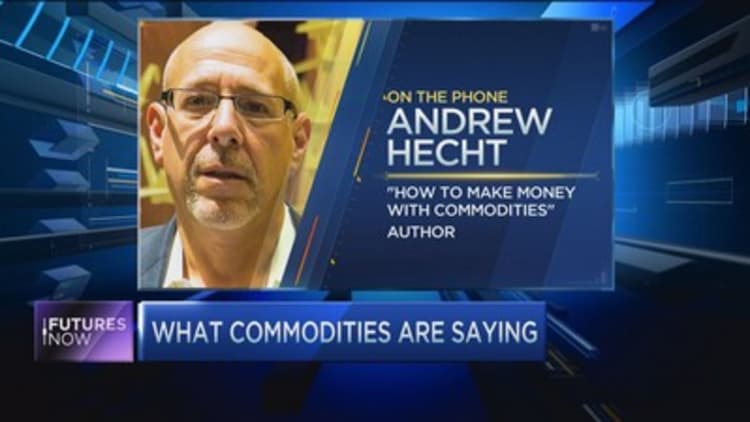
The bad news for commodities could be spreading.
As gold, oil, copper and other commodities tumble to multiyear lows, one expert says the turmoil is far from over. In fact, he said the collapse could mean that a full-blown market correction is just around the corner.
"We're looking at real weakness in the stock market here in the U.S.," Andrew Hecht said Tuesday on CNBC's "Futures Now." "We've had a really good time in that market, and I think it's overdue for a correction."
Hecht, author of "How to Make Money with Commodities," said he's watching three commodities markets in particular: copper, oil and lumber. Hecht said copper is especially signaling a global slowdown, most notably in China.
Copper has fallen almost 17 percent this year to new six-year lows. Crude oil is down about 14 percent year to date, but saw a brief rally of 2 percent on Tuesday. Lumber has fallen about 22 percent this year.
Read More Analysts: Commodities dip derails Fed rate hike
Hecht said although August will see some volatility and bounces in commodities markets, there's still a lot more downside risk in all raw materials.
"We'll see a lot of moves like we're seeing in crude oil today, but I think once September, October settles in, we'll see another leg down in these commodity markets, and that does not bode well for equity markets in the U.S.," Hecht said.
Traders Jim Iuorio and Brian Stutland said on CNBC's "Futures Now" they believe oil will continue to trade lower despite Tuesday's rally.
"There's so much telegraphed to the downside, but we haven't even had one ounce of good news, and I think you need something going to get [a bottom] started," Stutland said Tuesday.
Hecht also said prices in copper, gold and silver could fall to levels not seen since the previous plunge in 2008.
"The commodities market since 2011 has been making a series of lower highs and lower lows and I think that's going to continue," Hecht said.


